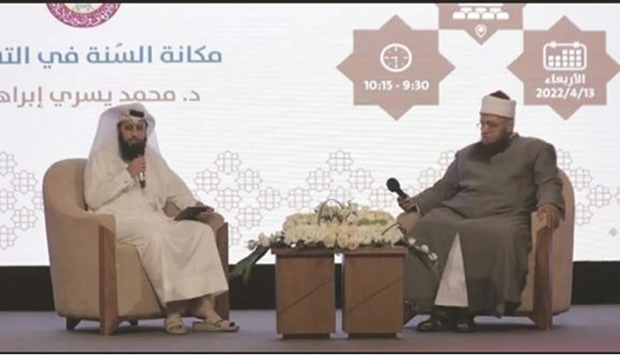The Ministry of Endowment (Awqaf) and Islamic Affairs organised a seminar titled 'The Status of the Sunnah in Jurisdiction', as part of the events of the Ramadan Book Fair, which will continue in the western square of Souq Waqif until on Saturday. Dr Mohamad Yousri Ibrahim, Vice-President of the American Open University, Vice-President of Al-Madinah International University in Malaysia, spoke during the seminar, which was moderated by the presenter Abdullah al-Buainain.
The seminar discussed the Sunnah (Arabic term for the Prophet Muhammad's (PBUH) way of life and legal precedent), being a source of legislation. Dr Mohamad Yousri Ibrahim said: “The Prophet Muhammad (PBUH), knew about writing, approved it and commanded it, and that his Sunnah was written by some of his companions, may Allah be pleased with them, during his lifetime. Such as Abdullah bin Amr bin al-Aas, and Ali bin Abi Talib, and the Messenger (PBUH), wrote to the kings and princes and called them to Allah Almighty, and reminded them in his role, as the Messenger (PBUH).”
He added that the honourable Sunnah was written during his rule, (PBUH) with his permission and approval, but the Sunnah was not written in complete during his time, (PBUH) as writing was not widespread during the era of the Companions, may Allah be pleased with them, as they kept the Sunnah by learning it off by heart.
Dr Mohamad Yousri Ibrahim attributed the non-writing of the Sunnah during the era of the Companions, may Allah be pleased with them, to their fear that the Prophetic Sunnah would be mixed with the Holy Qur’an. He explained that the revelation had not yet been completed, so the Companions feared that suspicion and confusion would ensue. Except that after the Prophet Muhammad’s (PBUH) death , Abu Bakr al-Siddiq, may Allah be pleased with him, was keen to collect the Noble Qur’an.
He pointed out that the first to collect the honourable Sunnah of the Prophet Muhammad (PBUH) was the rightly-guided Caliph Omar bin Abdulaziz, fearing that some of this Sunnah would disappear. So he ordered his workers in the villages, led by Mohamad ibn Shihab al-Zuhri, to write the Hadith of the Messenger (PBUH), and he collected what was available of the Honourable Sunnah. Later narrators followed Muhammad ibn Shihab al-Zuhri, and began to write down, and took care of the Sunnah, in the second century AH.
Much of the Sunnah was collected, the most famous of which are the Musnads (collections of Hadith arranged according to the Companion who transmitted them from the Prophet Muhammad (PBUH). Then came the al-Jama’ books (meaning "the encyclopedia" or "the comprehensive" books), which classified the Sunnah objectively.
Dr Mohamad Yousri Ibrahim described the third century AH as being the golden age of recording Sunnah, and in this era came the Sahih, as Imam Al-Bukhari, together with Abu Dawud, Al-Nasa’i, Ibn Majah, Ibn Hibban, and others wrote down the Prophet’s Sunnah. He concluded by pointing out that the Sahih of Al-Bukhari and the Sahih of Muslim included the authentic Hadiths of the Prophet Muhammad (PBUH).
The seminar discussed the Sunnah (Arabic term for the Prophet Muhammad's (PBUH) way of life and legal precedent), being a source of legislation. Dr Mohamad Yousri Ibrahim said: “The Prophet Muhammad (PBUH), knew about writing, approved it and commanded it, and that his Sunnah was written by some of his companions, may Allah be pleased with them, during his lifetime. Such as Abdullah bin Amr bin al-Aas, and Ali bin Abi Talib, and the Messenger (PBUH), wrote to the kings and princes and called them to Allah Almighty, and reminded them in his role, as the Messenger (PBUH).”
He added that the honourable Sunnah was written during his rule, (PBUH) with his permission and approval, but the Sunnah was not written in complete during his time, (PBUH) as writing was not widespread during the era of the Companions, may Allah be pleased with them, as they kept the Sunnah by learning it off by heart.
Dr Mohamad Yousri Ibrahim attributed the non-writing of the Sunnah during the era of the Companions, may Allah be pleased with them, to their fear that the Prophetic Sunnah would be mixed with the Holy Qur’an. He explained that the revelation had not yet been completed, so the Companions feared that suspicion and confusion would ensue. Except that after the Prophet Muhammad’s (PBUH) death , Abu Bakr al-Siddiq, may Allah be pleased with him, was keen to collect the Noble Qur’an.
He pointed out that the first to collect the honourable Sunnah of the Prophet Muhammad (PBUH) was the rightly-guided Caliph Omar bin Abdulaziz, fearing that some of this Sunnah would disappear. So he ordered his workers in the villages, led by Mohamad ibn Shihab al-Zuhri, to write the Hadith of the Messenger (PBUH), and he collected what was available of the Honourable Sunnah. Later narrators followed Muhammad ibn Shihab al-Zuhri, and began to write down, and took care of the Sunnah, in the second century AH.
Much of the Sunnah was collected, the most famous of which are the Musnads (collections of Hadith arranged according to the Companion who transmitted them from the Prophet Muhammad (PBUH). Then came the al-Jama’ books (meaning "the encyclopedia" or "the comprehensive" books), which classified the Sunnah objectively.
Dr Mohamad Yousri Ibrahim described the third century AH as being the golden age of recording Sunnah, and in this era came the Sahih, as Imam Al-Bukhari, together with Abu Dawud, Al-Nasa’i, Ibn Majah, Ibn Hibban, and others wrote down the Prophet’s Sunnah. He concluded by pointing out that the Sahih of Al-Bukhari and the Sahih of Muslim included the authentic Hadiths of the Prophet Muhammad (PBUH).

